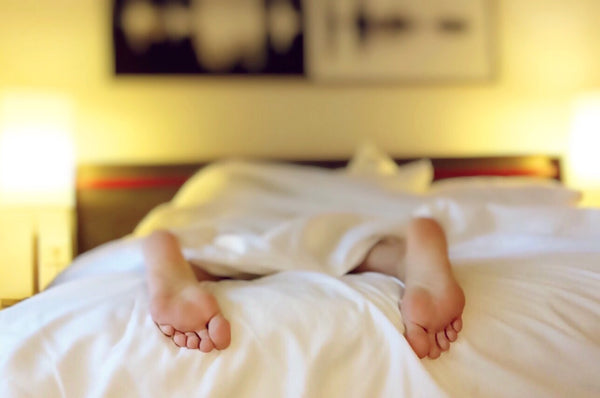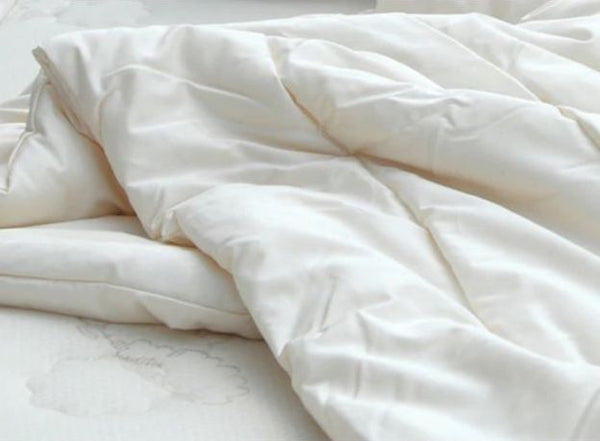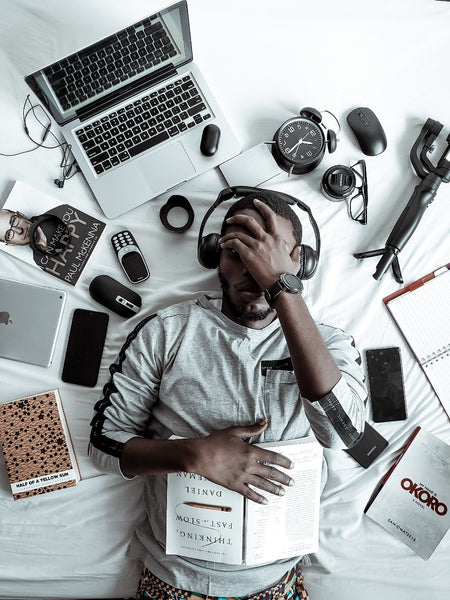Hello, folks! Happy New Year! It’s been a while since my last blog. Hope everyone is doing well and staying healthy. It’s a new year, a fresh start, and the perfect time to make positive changes in our daily lives, routines, and habits. While everyone is trying to stick with their resolutions, often surrounding diet and exercise, something that is often overlooked yet crucial to your overall health is sleep. Sleep is magical, it’s wonderful, but most importantly it is absolutely necessary. Sleep is about much more than simple rest after a long day. Sleep, or lack thereof, can have severe consequences on our health. Here we will explore the benefits of sleep, what can be affecting our ability to get a good night’s sleep, and tips for improving our sleep in order to achieve significant rest. Hang onto your hats. We’re diving right in.

Benefits of Sleep
According to the US Department of Health, getting enough sleep has physical, mental health, and cognitive benefits. Physical benefits include a stronger immune system, better heart health, and weight gain prevention. Of course, that doesn’t mean that sleep will make you immune to every disease, eliminate any possibility of heart disease or cure heart disease, and it certainly doesn’t make sleep the best diet in the world. Sleep allows your body much needed time to recover and heal from the daily wear and tear. Sleep gives your body the time and energy to fight off illness and injury.
Next, we have mental health benefits which include reduced stress and an improved mood. As I will discuss next, sleep helps us achieve greater focus and productivity which in turn helps us feel more collected and prepared. Preparedness helps with stress management, thus improving mental health and our emotional stability. Ever heard the expression “woke up on the wrong side on the bed?” Well, it’s less waking up on the wrong side and more waking up unrested and tired. Getting enough sleep means being well rested→ being well rested means being less grumpy. So, if you’re in a bad mood… you might need a Snickers or you might just need a nap.

Finally, sleep has a few cognitive benefits including heightened productivity, greater focus, and improved memory. You might be comfortable with the levels of focus and productivity you are functioning at, but did you know that hundreds of fatal car accidents are caused by drowsy drivers every year? If you are someone with a long commute or with a job that requires a lot of driving, not getting enough sleep can be deadly. Sleep is also crucial for learning and memorization. I learned in my Intro to Psych class at UCLA that sleep is very important when studying, which was a hard sell for a room full of sleep deprived, energy-drink-high, procrastinating students. While we sleep, our brain processes the data collected throughout the day and consolidates the info for better recall later. I believe we can all agree that getting enough sleep is important and absolutely necessary. Now excuse me while I work hard to prove this hypothesis with my own, at-home research.
Common Factors Affecting Sleep
There are many factors that can be keeping you from the recommended 7-9 hours of sleep including stress or anxiety (yes, I know: sleep helps reduce stress so how can you reduce your stress levels if stress is keeping you from sleeping? It can be a vicious cycle…), pain, health conditions, untreated sleep conditions, substances, medications, or even your sleep environment. Of course, I am not a medical professional, nor am I a sleep specialist so I cannot tell you the specific reason you are having trouble sleeping, but perhaps a list of possible causes can help you narrow down the search for your sleep deprivation culprit.

If your issue is pain, the cause could be your mattress. Perhaps it is too old or maybe it’s not the best suited for you and your specific needs. For a quick mattress guide to help you on your search for your perfect mattress please check out our past blog post on the topic titled “Mattress Type Comparisons”.
Another common sleep deprivation culprit is caffeine. I know, I know… I too indulge frequently in consuming the elixir of life (I’ve been drinking coffee since the age of 10. It’s a cultural thing. Don’t come for my parents; it was my grandma who gave me my first cup of coffee) but too much caffeine or caffeine too late could be affecting your ability to fall asleep and stay asleep. Consider drinking that second/third cup earlier in the day if you are having this issue and maybe switch to herbal tea in the later hours of the day. Finally, if you believe health conditions, sleep disorders, or medications are to blame, please consult your doctor.
We touched on a few things above with the nixing of caffeine late in the day and upgrading your mattress, but here are a few other things we can introduce/change about our routine to hopefully achieve better, more restful sleep. The Department of Health recommends spending time outdoors every day, so take a break from your screens and step outside for a few minutes. Spending some time outdoors breathing in the fresh air can help us relax a bit and relieve some stress, thus helping us fall asleep at night. Additionally, being in touch with the sun and sunlight hours can help regulate our internal clock, which can help us maintain our sleep schedule. Also, if you are having trouble sleeping at night and like to take naps during the day, limiting them to 20 minutes or less will keep your naps from greatly and/or further affecting your sleep at night. Quit smoking. That one is just a given and encouraged for many many many reasons, but the nicotine present in cigarettes can also make falling asleep harder, so flush that last pack and go get yourself some patches. We are kicking this habit.

After all that looking inward to understand our potentially problematic habits, it’s time to look outward and analyze our sleep situation. Yes, mattresses fall under this category and yes, we already covered that, but your sleep environment is much more than the mattress you lay your body on. If you are having trouble sleeping, confirm your bedroom is the perfect space for quiet, restful sleep. If there are street lights outside your window, consider putting up some light-blocking curtains. Another tip is to keep your room quiet or if you live in a city with unavoidable city noises (Los Angeles, I’m looking at you, with your sirens and helicopters at all hours of the day and night) you might consider acquiring a white noise/sleep sounds machine to help drown out unpleasant and disruptive noise. You might also consider upgrading your bedding. Polyester sheets and stuffy bedding can make a hot sleeper uncomfortably stuffy and sweaty. Opting for breathable cotton and naturally moisture-wicking wool can help keep you more comfortable while you sleep, thus preventing tossing and turning as a consequence of over-heating. Or maybe your mattress isn’t responsible for your neck or back pain. Maybe it’s your unsupportive pillow. We have a great assortment of natural fiber pillows from natural latex to buckwheat hulls. A well supported neck and head can help align the spine and relieve pain and discomfort.

Finally let us discuss the modification or implementation of a bedtime routine which is crucial when achieving consistent, restful sleep on a long-term basis. First, you want to go to sleep at the same time every night. This requires having and sticking with an organized daily schedule since there are many things throughout the day that can affect when you go to sleep. Going to sleep at the same time every night also ensures you get the same amount of sleep every night. Consistency is the name of the game. Sleeping 14 hours one night because you slept 3 hours the night before does not actually make up for the missed sleep and will leave you feeling tired. It is also important to avoid major stimulants right before going to bed. Eating, talking on the phone, using computers, smartphones, and watching tv can make shutting off your brain significantly harder, thus disrupting your sleep and keeping you awake.
What Can You Do Today to Get Better Sleep?
What can you do to get better sleep today? Upgrading your sleeping environment and changing your lifestyle--easy, right? As great as developing better eating habits and introducing exercise into your daily lives is, you cannot sleep on sleep. Movement is important but so is rest. Eating healthy is important, but sleep is equally so. Sleep deprivation has been shown to affect both short-term and long-term memory. It has been shown to increase the risk of heart disease, diabetes, and high blood pressure. Lack of sleep can weaken our immune system, affect our cognitive abilities, and dampen our overall mood. Good health is priceless-- never has this been more clear-- and we must do what we can to keep ourselves strong and healthy. Sometimes it’s as simple as hittin’ the hay.
Jovanna, Haiku Designs Staff

